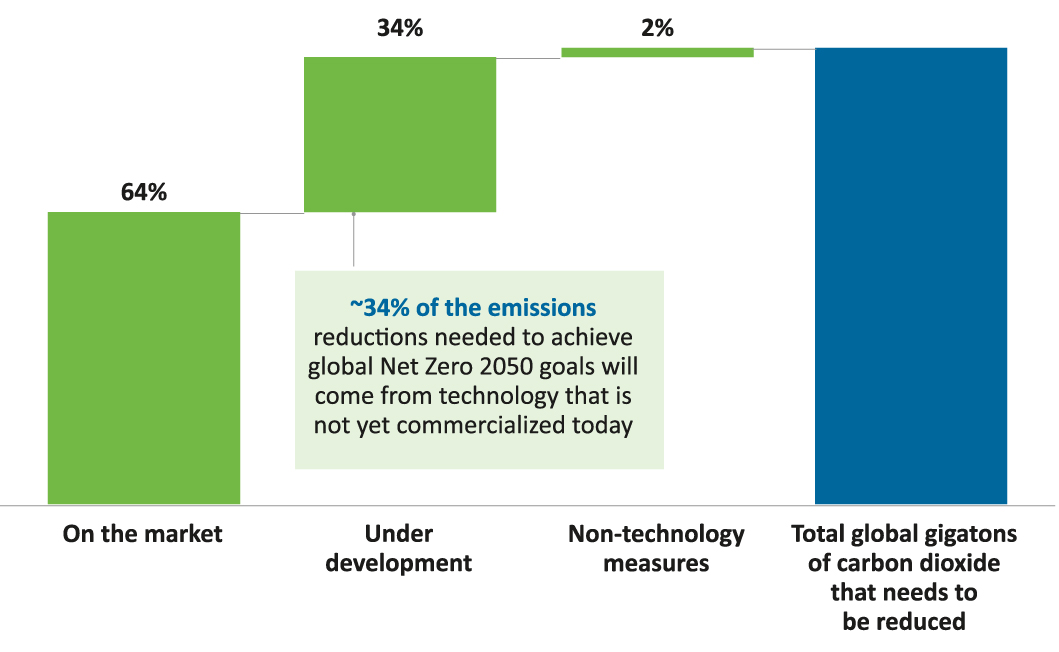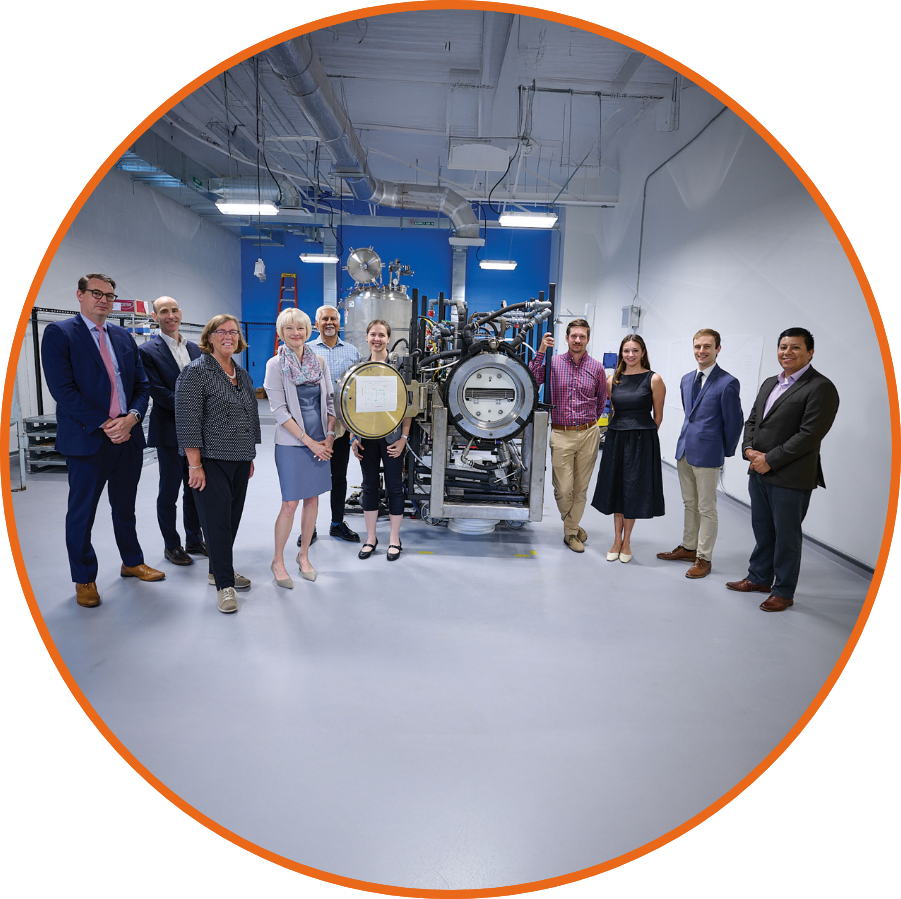Emerging Climatetech
Photo courtesy of Osmoses in Cambridge, MA
Climatetech: An Economic Opportunity For Massachusetts
Massachusetts is committed to taking a robust approach to addressing the challenges of climate change. “Climatetech” encompasses innovative technological solutions that mitigate the impacts of climate change, help communities adapt, and build resilience in systems and infrastructure.
In 2024, Governor Healey passed the Mass Leads Act, which unlocked funding for MassCEC to support climatetech companies and offshore wind economic development over the next ten years. Additionally, it formally established the climatetech definition within state law and expanded MassCEC’s scope of work beyond clean energy.
Mitigation
Capture or reduce greenhouse gas (GHG) emissions
Energy
Increasing renewable energy generation (e.g., offshore wind), improving energy efficiency, and modernizing the grid, leveraging batteries and energy efficiency, modernizing the grid, and leveraging batteries and energy storage technology.
Transportation
Transitioning to zero-emission vehicles
(e.g., electric vehicles), enhancing public transit, and promoting alternative fuel options.
(e.g., electric vehicles), enhancing public transit, and promoting alternative fuel options.
Buildings
We help new climate-focused businesses grow faster by backing a vibrant community of researchers, startups, and established industry players – creating an ecosystem where they connect and thrive.
Industry and Manufacturing
Adopting carbon-reducing technologies and processes, and implementing sustainable production practices through a circular economy.
Agriculture, Food, and Nature
Adopting sustainable farming and forest management practices, developing alternative proteins, and leveraging
nature-based solutions.
nature-based solutions.
Carbon Management
Developing and deploying carbon removal technologies including bioenergy with carbon capture, direct air capture, and blue carbon technology.
Adaptation and Resilience
Prepare for and respond to the impact of climate change
Adaptation and Resilience
Implementing climate-smart planning, strengthening infrastructure, and promoting nature-based solutions to reduce vulnerability to climate change with a focus on equity.
Breakthrough Technologies
Climatetech advancements will play a crucial role in Massachusetts reducing its greenhouse gas (GHG) emissions from ~64 million metric tons of carbon dioxide equivalent to its net zero GHG emissions goal by 2050.1 On a global scale, about 34% of emissions reductions will come from technologies that are not yet commercially available.2 MassCEC’s support of emerging climatetech will be critical to help bridge this market gap while creating increased economic opportunities within the Commonwealth.
Stage Of Development for Technology Required To Reach Global 2050 Net Zero Goals (2024)

Emerging Climatetech Investments
A robust innovation network is a key driver of the Massachusetts clean energy industry. Innovation support can take numerous forms, including ecosystem support, grants, and direct company investments.
Investments in clean energy companies can be divided into three stages:
STAGE I: Research & Prototyping – Companies at the ideation, theoretical research, and prototype development stage.
STAGE II: Demonstration & Acceleration – Companies at the product testing, system evaluation, and market research stage.
STAGE III: Commercialization & Growth – Companies that are expanding manufacturing capacity and identifying early-stage customers.
There has been a decline in clean energy and climatetech venture capital deal activity in Massachusetts following its peak in 2021, reflecting broader venture capital market trends. There are signs of an investor retreat, both from risky early-stage ventures as well as deals in more established companies. At the earliest stage, lower deal count has led to a notable decline in total investment: 2023’s Stage I deals had the lowest total dollars invested since 2016.
STAGE II: Demonstration & Acceleration – Companies at the product testing, system evaluation, and market research stage.
STAGE III: Commercialization & Growth – Companies that are expanding manufacturing capacity and identifying early-stage customers.
There has been a decline in clean energy and climatetech venture capital deal activity in Massachusetts following its peak in 2021, reflecting broader venture capital market trends. There are signs of an investor retreat, both from risky early-stage ventures as well as deals in more established companies. At the earliest stage, lower deal count has led to a notable decline in total investment: 2023’s Stage I deals had the lowest total dollars invested since 2016.
Total Investments in Massachusetts Clean Energy and Climatetech Companies (Millions)3
$3.4B
Was invested across all three stages in early-stage Massachusetts climatetech companies in 2023.
MassCEC SPOTLIGHT
MassCEC’s 2030 Fund
MassCEC launched the $50M 2030 Fund in 2022 to strategically invest in Massachusetts-based startups and provide funding for teams solving critical climate problems.

Clean Energy and Climatetech Grants
Public clean energy innovation grant and award funding for Massachusetts entities has increased for the first time since 2020.3
From 2022 to 2023, innovation funding increased by 92%, and the number of awards increased by 39%. This increase is likely in part due to the deployment of funds from the Inflation Reduction Act and the Bipartisan Infrastructure Law.
From 2022 to 2023, innovation funding increased by 92%, and the number of awards increased by 39%. This increase is likely in part due to the deployment of funds from the Inflation Reduction Act and the Bipartisan Infrastructure Law.
Total public sector grants received by all Massachusetts climatetech companies and partners for innovation, project demonstrations, and pilots.4
Public sector support is critical for the growth of climatetech companies, project demonstrations, and pilots.
MassCEC SPOTLIGHT
Accelerating Technology to Market
MassCEC’s technology-to-market programs help new climatetech businesses grow faster by backing a vibrant community of researchers, startups, and established industry players – creating an ecosystem where they connect and thrive.


AeroShield ribbon cutting at
new manufacturing facility in Waltham, MA.
new manufacturing facility in Waltham, MA.
MassCEC SPOTLIGHT
Emerging Climatetech Leaders
Early-stage clean energy and climatetech companies often face funding gaps that threaten their path to commercial success. MassCEC’s Emerging Climatetech programs help to fill these gaps with grant funding, equity and debt investments, and hands-on commercial and technical support for founders and startups.
2 International Energy Agency: Net Zero Roadmap https://www.iea.org/reports/net-zero-roadmap-a-global-pathway-to-keep-the-15-0c-goal-in-reachet-zero-roadmap-a-global-pathway-to-keep-the-15-0c-goal-in-reach climate-metrics
3 PitchBook Data, Inc. Data has not been reviewed by PitchBook analysts. Investment numbers vary between reports, given timing and availability of data.
4 Sources include MassCEC innovation funding, ARPA-E, Office of Science, SunShot, SBIR, and STTR.

